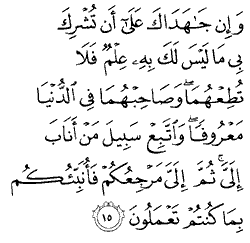Independent Personality, Helping the Poor, Hadith Forgery
Issue 668 » January 13, 2012 - Safar 19, 1433
Living The Quran
Independent Personality
Luqman - Chapter 31: Verse 15
 "However, if (your parents) try to force you to set up partners with Me, offering (deities) about which you know nothing, then don't obey them. Yet, still keep company with them in this world in a fair manner. Keep yourself on the path of those who turn towards Me, for all of you will return to Me, and I'm going to tell you the meaning of everything you did."
"However, if (your parents) try to force you to set up partners with Me, offering (deities) about which you know nothing, then don't obey them. Yet, still keep company with them in this world in a fair manner. Keep yourself on the path of those who turn towards Me, for all of you will return to Me, and I'm going to tell you the meaning of everything you did."
The Quran delineates a practical program for developing a sense of responsibility and for better use of human freedom and free will.
The Quran calls upon man to be and believe as a person free from any hereditary or environmental influences. Each individual must form his own opinion independently towards the truth. His decision in this regard should not be affected by his parents and forefathers or by social habits and customs. Each man must decide for himself.
Even though the Quran often admonishes us to fulfill our duties towards our parents, it warns us not to follow them blindly and describes some parents as ignorant and astray. The Quran gives this warning because it insists that every man must carefully and independently decide about his own beliefs, and should not be carried away by a blind love for his forefathers or their way of life. If the parents are wrong, astray, or ignorant, their children should be free to choose what is right and to reject their parents' false dogmas.
Compiled From:
"The Holy Quran: Guidance for Life" - Yahiya Emerick, p. 292
"Freedom and Responsibility in Quranic Perspective" - Hasan Al-Anani, p, 185
Understanding The Prophet's Life
Helping the Poor
Clothing
Ibn Abbas related that the Prophet said: Any Muslim who gives a Muslim a garment to wear will be in Allah's safekeeping as long as a shred of it remains on him. (Ahmad, Tirmidhi)
Feeding
Safwan ibn Salim related that the Prophet said: Anyone who looks after and works for a widow and a poor person is like a warrior fighting for Allah's cause, or like a person who fasts during the day and prays all night. (Bukhari)
Anas related that the Prophet said: If any Muslim plants something or sows seed from which a man, a bird or an animal eats, it counts as a charity for him. (Bukhari, Muslim)
Relatives who are needy
Abu Huraira narrated that the Prophet said: The best charity is that which is practiced by a wealthy person. And start giving first to your dependents. (Bukhari)
Salman ibn Amer reported that the Prophet said: To give something to a poor man brings one reward, while giving the same to a needy relative brings two: one for charity and the other for respecting the family ties. (Ahmad, Ibn Majah, Nasai, Tirmidhi)
Compiled From:
"The Quran and Hadiths on the poor and needy: a topical index" - SoundVision.com Staff Writer
Blindspot!
Hadith Forgery
[continued from previous issue]
History and Context
7. Careless Religious Zeal
Another category of fabricated hadith is associated with the religious zeal of individuals whose devotion to Islam led them to careless ascription of hadith to the Prophet. This is illustrated by the forgeries committed by one Nuh bin Abi Maryam on the virtues of the various suras of the Quran. He is said to have later regretted what he did and explained that he fabricated such hadith because he saw people who were turning away from the Quran and occupying themselves with the fiqh of Abu Hanifa and the battle stories of Muhammad bin Ishaq and that he did so as part of carrying out hisba, that is promoting good and forbidding evil, and that he "lied for the Prophet and not against him". This is considered as one of the worst forms of forgery as it almost succeeds to be convincing and becomes difficult to isolate. Numerous other names occur in the relevant literature, including those of Ghulam Khalil and Ibn Abi Ayyash of Baghdad, who were both known as pious individuals, but who invented hadith on devotional matters. Other examples of this kind include the so-called hadith that "the superiority of Rajab over other months is like the superiority of the Quran over other speech, and the superiority of Shaban over other months is like that of mine over other Prophets, and the superiority of the month of Ramadan is like that of God over His servants."
Other themes of hadith forgery include the urge on the part of courtiers who distorted hadith so as to please and flatter their overlords. Similarly, the desire to establish the permissibility or virtues of certain varieties of food, beverages, clothes and customary practices has led to forgery in the hadith. A number of fabricated ahadith have thus been recorded on the virtues of food items such as rice, lentils, aubergines, and places such as Asqalan, months of the year, days and even certain times of the day, and also of personal names such as Ahmad and Muhammad, etc.
[to be continued ...]
Compiled From:
"A Texbook of Hadith Studies" - Mohammad Hashim Kamali, pp. 70, 71